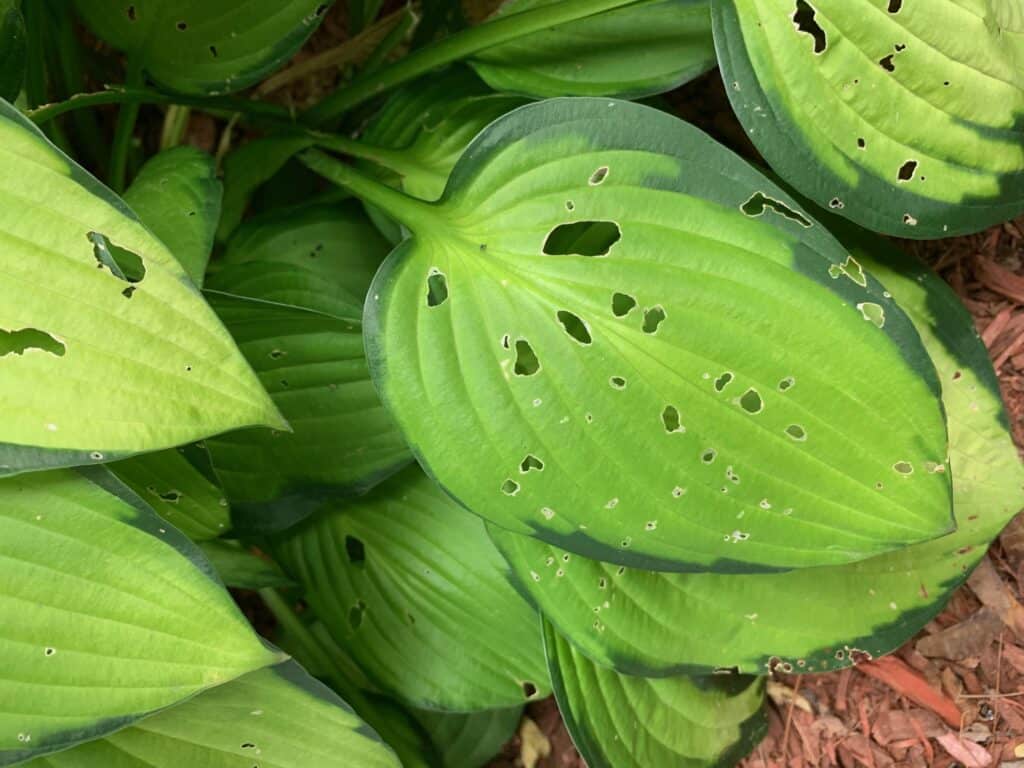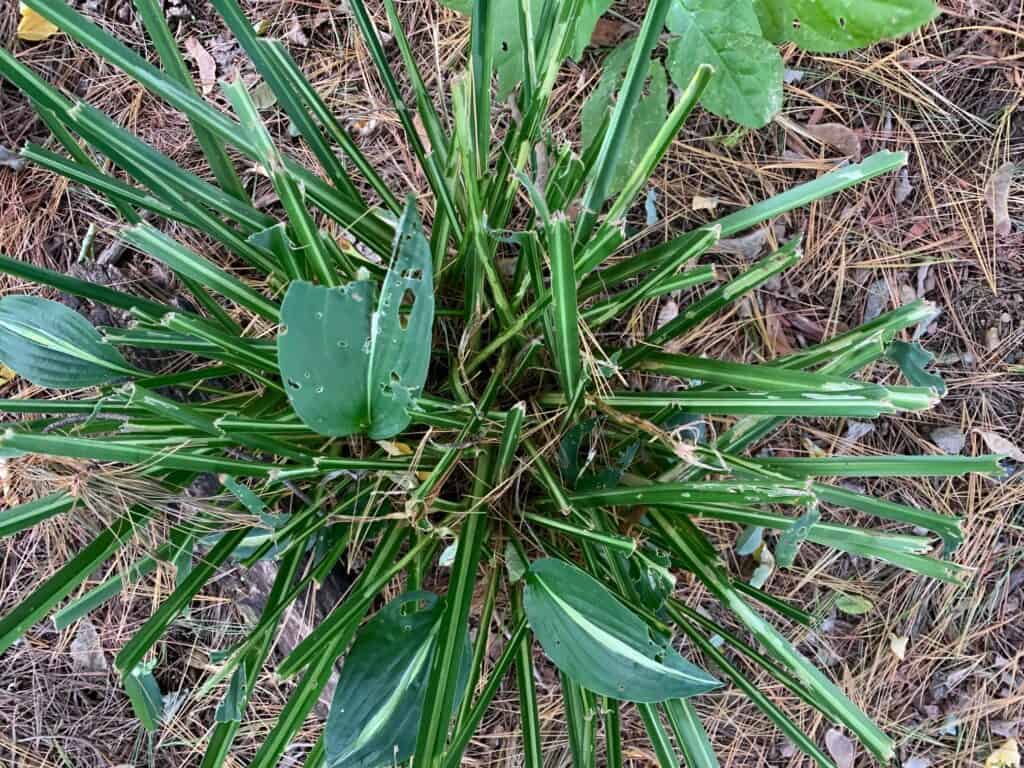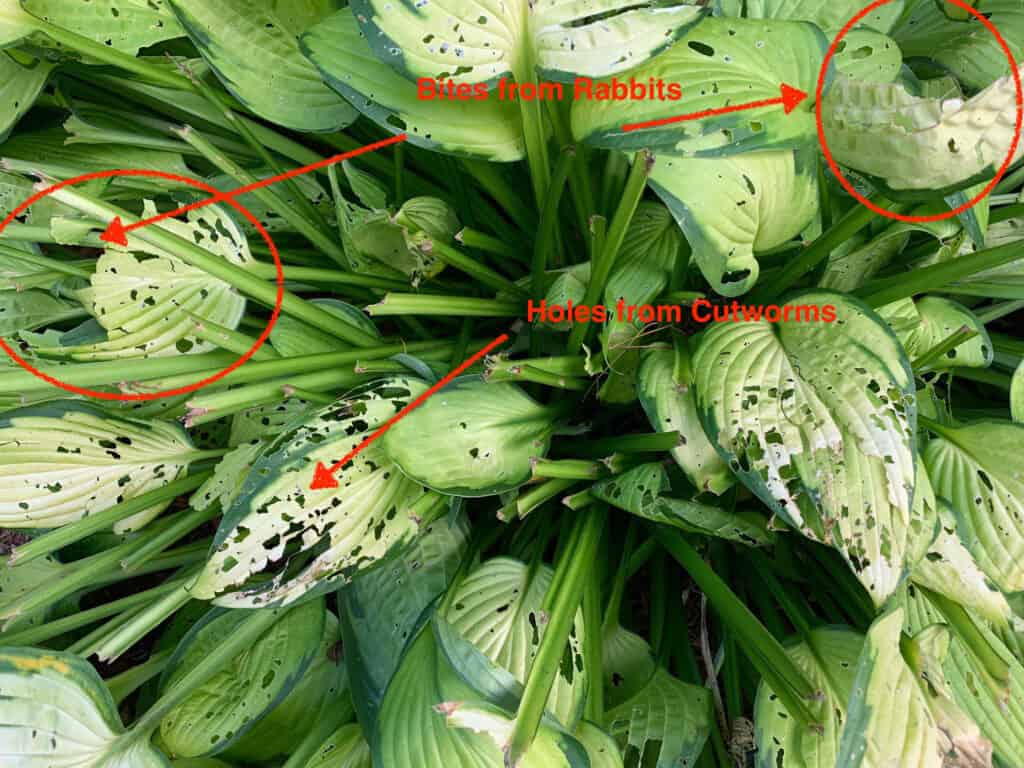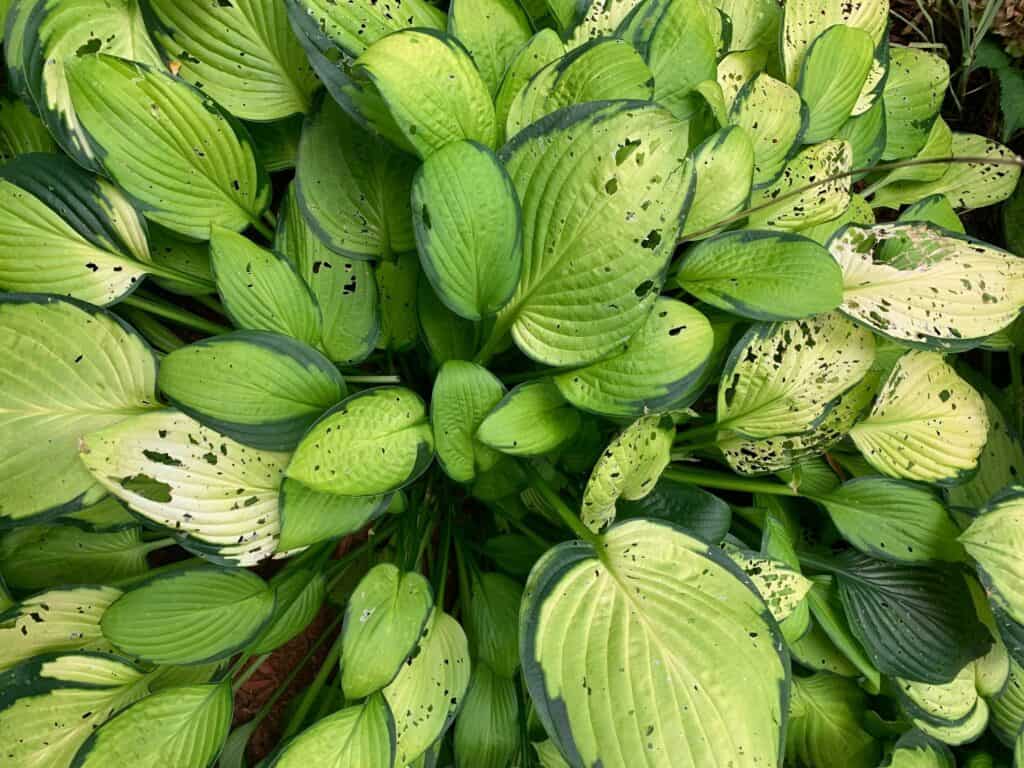Hostas are a favorite in perennial gardens. Easy to grow and low maintenance, comes back year after year with leaves looking bigger and more lush. Yet, all of a sudden you are seeing little holes all over your hostas! What is causing the holes on hostas? Or what about the little bites off the hostas? Something is eating your hostas! Below you will find common pests and critters that eats hosta leaves and how to prevent these pests from damaging your hostas.
Planting 101 participates in affiliate programs including Amazon Associates Program and may earn commission from qualifying purchases at no extra cost to you. We write these articles for free, so thank you for your support.
What is Eating Your Hostas?
What is eating your hostas will depend on the damage on your hostas. If the damage is big, like someone took a big bite off the hosta leaf then chances are it’s a big critter while if there are little holes all over your hosta leaves then it’s a small pest munching on your hosta leaves. Below you will find the common garden pests eating your hostas and how to prevent these pests from damaging your hostas.
Garden Pests Eating Your Hostas
There are several garden pests that loves to munch on hostas. There are insects such as cutworms that loves to chew on hosta leaves. Slugs are also another garden pest that loves to eat hostas. Bigger garden critters such as rabbits and deer can also be blamed for the chewed up hostas in your garden. In order to determine which garden pest is damaging your hosta, we need to do some detective work. You need to study the damage done on your hostas to determine exactly who is eating your hostas.
Little Holes all Over Your Hostas
If you are seeing little holes all over the hosta leaves, then more than likely you have cutworms or slugs eating your hostas. How do you tell apart between cutworm damage on hostas versus slug damage on hostas?
Cutworms vs. Slugs Eating Your Hostas
Both cutworms and slugs will leave little holes all over hosta leaves. However, don’t expect to see cutworms or slugs in action chewing on your hostas both feed at night.(although on very cloudy days, you may be able to see slugs and cutworms in action). The main way to tell the difference between cutworm or slug damage is to look at the location of holes on the hosta leaves.
How Can You Tell if Cutworms are Eating Your Hostas?
Look at the holes on your hosta leaves, Variegated cutworm (Peridroma saucia) likes to climb up and chew on hosta leaves. One tell tale sign that it is cutworms eating your hostas is if the holes are only on the soft part of the hosta leaf and not the veins. Cutworms don’t like the veins, they will leave holes all over the soft part of the hosta leaves avoiding the veins. In addition to the location of the hole, cutworms prefer the emerging leaves near the center of the crown. If you see a larger proportion of leaves near the center of the crown with holes then more than likely cutworms are eating your hostas. Below you will find a photo of hosta leaves damaged by cutworms. See how the holes are in between the veins?

How Can You Tell if Slugs are Eating Your Hostas?
Unlike cutworms, Slugs are not as picky when it comes to eating hostas. Slugs pretty much will eat every part of the hosta leaves- veins and all! If you see small holes everywhere on your hostas then chances are your offender are slugs and not cutworms.
How to Tell if Deer are Eating Your Hostas
Hostas are a favorite for deer. Every time I see a family of deer passing through my backyard, they go straight to my hostas (and yews). Deer of all sizes love to munch on hosta leaves. Unlike the little holes left behind by slugs and cutworms, deer will eat entire hosta leaves. You will be left with only hosta stems after the deer are done eating your hostas. Below you will find a hosta without leaves, just stems! I took this picture after a family of deer walked through my backyard!

How to Tell if Rabbits are Eating Your Hostas
Rabbits are like deer, they love munching on hostas. Hostas are a good height for hungry rabbits since they don’t get that big. Rabbits will take bites out of hosta leaves. If they are very hungry, they might eat the entire leaves otherwise you will just see big bites out of hosta leaves. Big bites on hosta leaves are a tell tale sign that rabbits are eating your hostas and not deer.
The photo below is an example of hosta damage caused by cutworms and rabbits. Some of the hosta leaves have been bitten off by rabbits. Entire leaves have also been eaten by rabbits (see the leafless stems) There are also many little holes on the hosta leaves. The holes are on the soft part of the hosta leaves, in between veins which means it is caused by cutworms not slugs.

How to Stop Slugs From Eating Hostas
There are many ways to stop slugs from eating your hostas. Slugs don’t like to go on non-smooth surface so if you make the soil surface under your hostas rough, that can deter slugs from getting on your hostas. You can do this by adding mulch around your hostas, the rough surface from mulch can prevent slugs from getting close to your hostas. You can also add cracked egg shells around the hostas to create a rough surface for the slugs.
Another method to stop slugs from eating your hostas is to sprinkle diatomaceous earth around the hostas. The diatomaceous earth will create a rough surface discouraging slugs from climbing up your hostas plus it will cause the slugs to dehydrate and die. The good thing about diatomaceous earth is its safe around children and pets. Note that diatomaceous earth are not effective when wet so only use it on a dry day when the soil is not wet.
Buy It from Amazon: Diatomaceous earth
You can also use Sluggo Plus to stop slugs from eating your hostas. Sluggo Plus contains iron phosphate which are naturally occurring in soil. It will kill slugs but will not kill birds, garden critters and pets. It even breaks down into fertilizer overtime! It’s easy to use, just sprinkle Sluggo Plus granule around your hostas to get rid of slugs.
Buy It from Amazon: Sluggo Plus
Finally, if you are up for the task, you can always try to catch the slugs from your garden the old fashioned way. You can do this by going slug hunting at night. Slugs are most active at night, grab a flashlight and hunt for slugs! My kids love hunting for slugs at night! If hunting for slugs at night is not your thing, you can also catch slugs by simply leaving a piece of cardboard in a damp spot near your hostas. In a day or two, you will find slugs under the cardboard.
How to Stop Cutworms from Eating Your Hostas
There are a few things you can do to stop cutworms from eating your hostas. If you are up for it, rake around the damaged hostas and use your hands to comb through the soil and mulch to catch cutworms. Otherwise, you can catch cutworms in the act at night when they are feeding on hostas. Simply check your hostas at night and catch the cutworms making holes in your hostas. You can also use Sluggo Plus to kill cutworms. It’s the same granule that you use to get rid of slugs. It will also kill cutworms. Just sprinkle Sluggo Plus granules around your hostas to get rid of cutworms.
Buy It from Amazon: Sluggo Plus
How to Stop Deer and Rabbits from Eating Your Hostas
Deers and rabbits are attracted to hostas. You can stop them from eating your hostas by putting up a fence. A deer fence will prevent deer from coming into your garden. Otherwise, if rabbit is your culprit, then a low fence should be sufficient to stop rabbits from getting to your hostas. If fencing is not practical, then you can use deer repellent on your hostas. I like Liquid Fence. Liquid Fence works on both deer and rabbits. Just spray Liquid Fence on your hostas, the scent will repel rabbits and deer.
Buy It from Amazon: Liquid Fence
Another effective deer and rabbit repellent is Plantskydd. Just spray Plantskydd on your hostas. This really works in preventing deer and rabbit from eating your hostas.
But It from Amazon: Plantskydd
Milorganite is another product you can use to repel deer from your hostas. Milorganite is an organic fertilizer that has a smell that deer can’t stand. Use Milorganite around your hostas and the deer will stop coming. There is even research done at the University of Georgia showing how Milorganite is used to repel deer from ornamental plantings. I don’t have a deer fence, I use Milorganite to discourage deer from coming to my garden.
Buy It from Amazon: Milorganite

